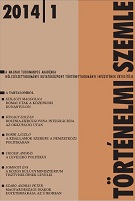A kisállamok szerepe a nemzetközi politikában
The Role of Weak States in International Politics
Author(s): László BorhiSubject(s): History
Published by: Magyar Tudományos Akadémia Bölcsészettudományi Kutatóközpont Történettudományi Intézet
Summary/Abstract: This article investigates the role of weak states in international politics through the case of East Central Europe in the 20th century. There is no clear cut definition of weakness in international politics. Strength or weakness can be described in relational terms only. For the purposes of this paper we have chosen to define weakness as subjugation to the domination or hegemony of other states for a protracted period of time. The “leverage of the weak” is a well-known phenomenon, but the role of weak states in international politics has not received ample scholarly attention. Occasionally the states between Russia and Germany had a profound effect on international relations throughout the 20th century while at times they were mere pawns in the struggle for domination and/or stability in Europe. In 1914 for instance a confl ict with Serbia led to the demise of the European order inaugurated at the Congress of Vienna; in 1989 upheavals in Poland and Hungary helped cause the transformation of the existing bipolar order. On the other hand, between 1938 and 1948 the area was used as a bargaining chip between the great powers in their efforts to reshape the European order. By looking at important nodes in the history of European politics in the 20th century – the territorial and political rearrangement of East Central Europe after World War I, the secret peace talks between the Axis and the Allies in 1942–1944, the establishment of the Soviet empire in Eastern Europe and finally, the internal-external linkages in the transformation of 1989 – this article will attempt to draw conclusions on conditions in which weak powers are policy takers and situations in which they are able to shape international politics.
Journal: Történelmi Szemle
- Issue Year: 2014
- Issue No: 01
- Page Range: 61-73
- Page Count: 13
- Language: Hungarian

